Robert Mason - Chickenhawk - Back in the World - Life After Vietnam
Здесь есть возможность читать онлайн «Robert Mason - Chickenhawk - Back in the World - Life After Vietnam» весь текст электронной книги совершенно бесплатно (целиком полную версию без сокращений). В некоторых случаях можно слушать аудио, скачать через торрент в формате fb2 и присутствует краткое содержание. Год выпуска: 2013, Издательство: BookBaby, Жанр: Старинная литература, на английском языке. Описание произведения, (предисловие) а так же отзывы посетителей доступны на портале библиотеки ЛибКат.
- Название:Chickenhawk: Back in the World - Life After Vietnam
- Автор:
- Издательство:BookBaby
- Жанр:
- Год:2013
- ISBN:нет данных
- Рейтинг книги:3 / 5. Голосов: 1
-
Избранное:Добавить в избранное
- Отзывы:
-
Ваша оценка:
- 60
- 1
- 2
- 3
- 4
- 5
Chickenhawk: Back in the World - Life After Vietnam: краткое содержание, описание и аннотация
Предлагаем к чтению аннотацию, описание, краткое содержание или предисловие (зависит от того, что написал сам автор книги «Chickenhawk: Back in the World - Life After Vietnam»). Если вы не нашли необходимую информацию о книге — напишите в комментариях, мы постараемся отыскать её.
Chickenhawk: Back in the World - Life After Vietnam — читать онлайн бесплатно полную книгу (весь текст) целиком
Ниже представлен текст книги, разбитый по страницам. Система сохранения места последней прочитанной страницы, позволяет с удобством читать онлайн бесплатно книгу «Chickenhawk: Back in the World - Life After Vietnam», без необходимости каждый раз заново искать на чём Вы остановились. Поставьте закладку, и сможете в любой момент перейти на страницу, на которой закончили чтение.
Интервал:
Закладка:
Deacon showed me his system of books in which he logged in every required task and checked it off when done. He managed everything, a kind of master sergeant for the company commander, Baker. All Baker wanted to know about anything was where he was supposed to sign. If he got questions back from the front office, he was briefed by Deacon. Usually Baker would ask Deacon to compose and type the responses to queries from administration. Among my first tasks was to write a report to administration about why we needed to order some new boots.
Deacon loaded me up with typing jobs and kept a careful watch on my output. When he figured I could type well enough, he began to teach me how to conduct inventories of the stockrooms. Inventory reports were due every quarter, but we did one when I’d been at the clothing room for a couple of weeks so I could start off with a fresh slate. Everything in the warehouses was stacked neatly, labeled. The inventories were professionally done. Deacon took his job very seriously.
The only time it was wildly busy at the clothing room was in the afternoon when the inmates returned from work. Lines of inmates, sometimes a hundred or more, formed up in the afternoons to get their laundry. The rest of the day was fairly slow. Inmates sorted clothes and bullshitted, keeping an eye out for intruders from administration who expected to see inmates working at a feverish pace no matter the work load—just like anywhere else.
While Deacon trained me, we became friendlier. Deacon was a curmudgeon, a proud and ornery man in his late sixties. When we walked back to his dorm one afternoon, he told me he’d been in jail once before, during World War II, for resisting the draft. He had gone to jail at that time for his beliefs, but this incarceration was a setup. Deacon was a biochemist. He’d shown me two texts he’d published. As head of the anthropology department at a large university, he’d been making his own psychotropic drugs with which to test his lab animals. He claimed he could guarantee consistent quality in the drugs by making his own—stuff like LSD. Being around the utterly serious and caustic Deacon, it wasn’t difficult to believe that he had made a lot of enemies at the university. He was very abrasive, impatient, not at all given to platitudes and encouragement. A graduate student he’d refused to accommodate—something about low grades and a delayed graduation if Deacon wouldn’t help—turned him in for making the drugs. In court, Deacon didn’t deny making the drugs, claimed it was his professional right to make them if he wanted to, called the female prosecuting attorney at his trial a Nazi whore, and generally behaved like Deacon. He was famous in camp for refusing to go before the parole board to get his sentence reduced. He felt it would be groveling before inferior men. That cost him a couple of extra years. Deacon stood up for himself when most people at camp would call what he was doing pissing into the wind. I had to respect him.
Two weeks into the job, I was typing a letter for Baker when I heard “Warden’s coming” from the guys out on the porch. I looked up and saw the warden and his assistant walking down the service road toward us, the same warden who had said, “No writers around typewriters.” I jumped up from my desk and told Baker I had to leave for a minute. He nodded, but he was himself getting organized for the impromptu inspection. His bosses had run out to their respective crews, and in seconds the clothing room was bustling with activity. Twenty inmates moved stacks of clothes from where they were to where they weren’t and then back again. It was all very impressive. I ran through the issue room and into the stockroom, where I hid behind a tall stack of Army blankets.
It took about five minutes for the warden to get to the stockroom. I heard him talking to Baker in the hallway, his voice muffled. His voice got louder as he came into the stockroom. He looked around quickly, said the place looked good, and left. When I heard the all clear, I went back to my desk.
“Where’d you go, Bob?” Baker said.
“Had to go to the john. Stomach,” I said.
“Too bad,” Baker said.
I fell into step. My days had become routine, which I could follow while thinking of other things. Up at seven. Breakfast at seven-thirty. Read from eight to nine. Go to work at nine. Lunch at ten-thirty. Back to work at one. Dinner at four-thirty. Walk and shower, one hour. Free time until sleep.
In November, Viking sent Knox a check for more than a hundred thousand dollars, and Chickenhawk was still selling well. When Knox told me this, it felt like he was talking about somebody else’s book.
Patience would get the money and could finally quit her house-cleaning work. I was grateful she could stop. Maybe she’d finish that novel she’d been working on. Anyway, that was her world.
I was here. I lived on my twenty-five dollars a month. I had a full-time job. I had dropped out of the real world.
I’d brought my robot book manuscript to Eglin with the intention of finishing it. I wouldn’t be allowed to publish it while I was in prison, but I visualized myself walking out the front gate with the completed manuscript under my arm—making the best of a bad situation.
Writing, however, was problematic. There was never time at the clothing room. As Deacon trained me (”No, Bob, not form twenty-eight. Form twenty-one. You really have a college education?”), I realized just how much he did there. I was expected to do the same, and I was willing, especially considering the alternative, landscape, but I still had to get a place to write. Dorm Three was a nightmare. It was the only dormitory without air-conditioning. Two giant fans buzzed constantly, men argued, laughed, talked until lights out at ten. The place was noisy beyond belief. The reading rooms—the last quiet places on camp—were now all game rooms. The library was a converted closet with no room to spare. The legal library had three typewriters, but they were restricted for use to prepare legal briefs. Inmates waited in line to type up their appeals. The one thing I could do in the noise was read. Since my robot book was going to be an adventure novel, I checked adventure novels out of the inmate library. I read Aztec , Eye of the Needle, Little Big Man, Marathon Man, The Key to Rebecca, and many others. I read John Gardner’s Art of the Novel , and learned the word denouement, which means the solution, the end, of a novel, and now had a professional writing term to use in conversations with inmates, along with suggestions to not split infinitives or leave participles dangling. My inability to write in prison applied to my letters home as well. The ones I did manage were short and essentially incoherent.
Problems at the clothing room occupied my mind. Inventory coming up in a week, need to order new shirts, socks getting low, Deacon leaving soon, and so on.
I’d been in the clothing room for three weeks when, just before Christmas, the warden discovered me. I was typing a report for the commissary because, although Foster did their receiving for them, he could not type up the reports. Foster’s big job, I observed, was operating an ancient, programmable adding machine with which he calculated the retail prices for the stuff the commissary received. It took him maybe a half hour a day to figure the twenty percent markup for the stuff on the receiving tickets, and then he handed the stack to me for typing and left to do whatever he did. I didn’t care. I liked typing, and Foster had helped me get my job. I typed. Baker was out of the office. I heard the door open, figured it was Baker coming in, kept on typing. Felt someone staring at me. Looked up. The warden. I stopped typing. The warden smiled the slightest smile and shook his head. He nodded at me sternly, turned, and walked out of the office. I watched him walk up the sidewalk toward the administration building. Baker returned. I told him the warden had been here. He was surprised; there had been no inspection. I told him that I thought he might be getting a call from the warden about me because the warden had told me he’d never let me work around a typewriter.
Читать дальшеИнтервал:
Закладка:
Похожие книги на «Chickenhawk: Back in the World - Life After Vietnam»
Представляем Вашему вниманию похожие книги на «Chickenhawk: Back in the World - Life After Vietnam» списком для выбора. Мы отобрали схожую по названию и смыслу литературу в надежде предоставить читателям больше вариантов отыскать новые, интересные, ещё непрочитанные произведения.
Обсуждение, отзывы о книге «Chickenhawk: Back in the World - Life After Vietnam» и просто собственные мнения читателей. Оставьте ваши комментарии, напишите, что Вы думаете о произведении, его смысле или главных героях. Укажите что конкретно понравилось, а что нет, и почему Вы так считаете.












